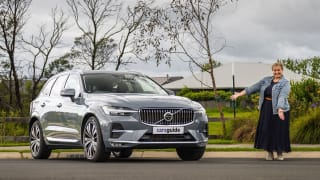
Which camper-trailer is right for you: on-road or off-road?

The simple notion of a camper-trailer itself conjures images of grand adventures on the beach or in the bush, but there is a distinction between those campers capable of being taken into true off-road territory and those that aren’t.
On-road or touring-style camper models are designed to spend the lion’s share of their life being towed on bitumen with infrequent jaunts onto well-maintained dirt roads in dry weather, while hard-core off-road campers have been engineered to withstand plenty of punishment off the beaten track and still keep on trucking.
But if a camper’s off-road capability doesn’t even really matter to you and your family, then why buy one that is geared up for those kinds of trips? Perhaps an on-road-biased model should be your focus. Here’s our guide to help you figure out which camper is best suited to you and your needs.
On-road/touring camper-trailers

As indicated earlier, on-road or touring-style camper models have been made to be towed on bitumen road surfaces with little time spent on anything more difficult than well-maintained gravel roads in a national park or state forest. Their suspension set-ups, tyres and general engineering are more geared towards consistent-surface road duties than the constant punishment of off-road trips.

A touring camper is not made for hard-core off-roading. Case in point: Jayco makes a range of touring-style campers designed to be predominantly driven on bitumen roads and, at the very worst, may be taken on well-maintained gravel roads in dry weather, but as showroom standard they have not been engineered for real off-roading.
With a beam axle, leaf slipper springs and shock absorbers, touring campers do a good job of dealing with on-road duties but anything more difficult than that should be avoided.
Outback/off-road camper-trailers

The Australian market has a fair few campers which are actually able to be taken off-road – some, like Patriot Campers' products, are even capable of tackling ‘4WD only’ tracks – but make sure you’re getting what you paid for. Some campers from some manufacturers are perceived by the potential buyer to be ready for bush-or-beach trips but, if you read the fine print more closely, track conditions on which those campers can be towed are markedly different to what you might imagine them to be.
Campers that are genuinely capable of off-roading will generally cost more than their on-road counterparts because of the more robust materials used, as well as the comprehensive purpose-specific design and engineering undertaken, to build the products. Off-road campers have more ground clearance, stronger underbody protection, and more aggressive dust-sealing measures, among other features, than their on-road-focussed counterparts. Suspension set-ups range from coil-spring independent suspension through to Patriot Campers' Cruisemaster adjustable dual-shock, air-bag arrangement.

Jayco makes a range of Outback camper models built to tackle dirt tracks and gravel roads, but certainly not 4WD-only tracks. The company is very clear about that: according to its warranty, Outbacks are “for limited unsealed road usage” and “are not designed for use on four-wheel drive only tracks”. Want confirmation? Take a look at the warranty fine print for yourself.
The single-axle Outbacks have a hot dip galvanised 'Endurance' chassis on Jayco’s 'JTech' coil-spring suspension with a little extra ground clearance over its road-focused Touring models. The Outbacks are good campers in their own right, but they have not been built for hard-core off-roading.
Jayco is certainly not alone in this respect as plenty of camper-trailer manufacturers have products whose' names and/or the marketing about them might indicate that those products have been built for serious 4WDing but the campers are, in real-world terms, only suited to light-duty off-roading, best summed up by our Light rating which incorporates the description: “Dry weather gravel roads and formed trails with no obstacles, very shallow water crossings.”
Buy a camper to fit your lifestyle

If you're planning bitumen-only sojourns to easy-access campsites then a touring or on-road pop-top camper will be more than enough for you as they are simple to set up, comfortable and packed with features.
However, if your adventure goals lean more towards the dirtier side of things – read: more than light-duty off-roading – then a camper capable of being towed through the rough stuff will be better suited to your plans. If you don't need an off-road-ready camper, however, don't be dazzled by knobbly tyres, black chequerplate and military-style design.
Use your head, not your heart, to steer your final buying decision – that way you'll end up with something you actually need, rather than something you simply want.










Comments